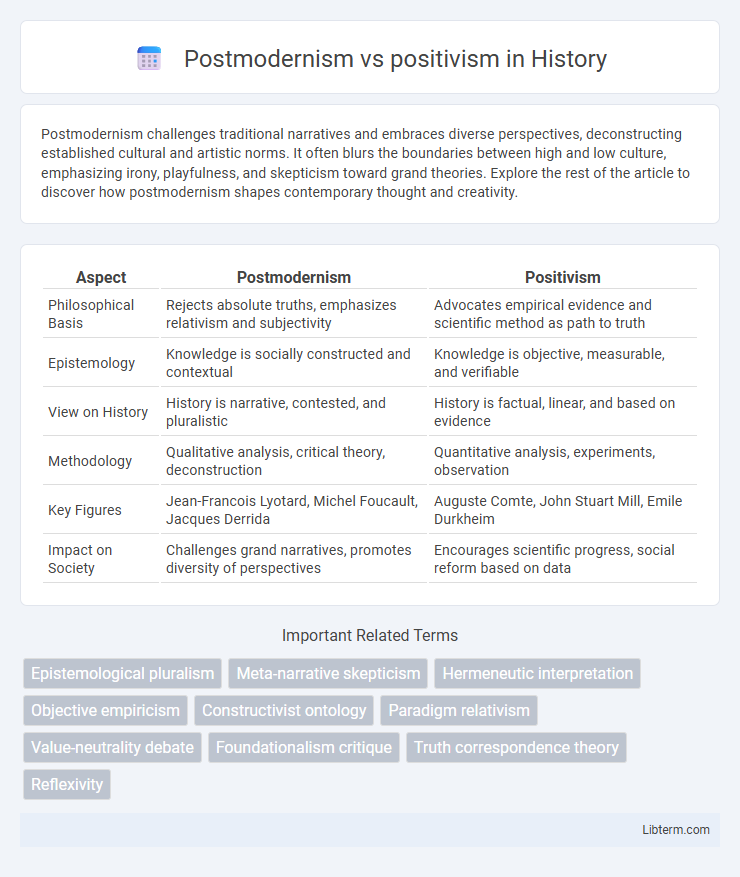Postmodernism challenges traditional narratives and embraces diverse perspectives, deconstructing established cultural and artistic norms. It often blurs the boundaries between high and low culture, emphasizing irony, playfulness, and skepticism toward grand theories. Explore the rest of the article to discover how postmodernism shapes contemporary thought and creativity.
Table of Comparison
| Aspect | Postmodernism | Positivism |
|---|---|---|
| Philosophical Basis | Rejects absolute truths, emphasizes relativism and subjectivity | Advocates empirical evidence and scientific method as path to truth |
| Epistemology | Knowledge is socially constructed and contextual | Knowledge is objective, measurable, and verifiable |
| View on History | History is narrative, contested, and pluralistic | History is factual, linear, and based on evidence |
| Methodology | Qualitative analysis, critical theory, deconstruction | Quantitative analysis, experiments, observation |
| Key Figures | Jean-Francois Lyotard, Michel Foucault, Jacques Derrida | Auguste Comte, John Stuart Mill, Emile Durkheim |
| Impact on Society | Challenges grand narratives, promotes diversity of perspectives | Encourages scientific progress, social reform based on data |
Introduction to Postmodernism and Positivism
Postmodernism challenges the objective truths and universal narratives promoted by positivism, emphasizing subjective experience and the relativity of knowledge. Positivism advocates for empirical observation and scientific methods to uncover consistent laws governing social and natural phenomena. The tension between these paradigms highlights differing approaches to knowledge, with postmodernism critiquing positivism's claims of certainty and emphasizing the influence of cultural, historical, and linguistic contexts.
Historical Background of Both Philosophies
Postmodernism emerged in the mid-20th century as a reaction against the rigid structures and absolute truths promoted by positivism, which originated in the early 19th century through the works of Auguste Comte. Positivism emphasized empirical observation and scientific methodology as the only sources of authentic knowledge, influencing disciplines such as sociology and natural sciences. In contrast, postmodernism critiques the foundational assumptions of positivism, highlighting the relativity of knowledge and the role of cultural and social contexts in shaping human understanding.
Core Principles of Positivism
Positivism rests on the core principles of empirical observation, scientific method, and the belief that knowledge is derived from sensory experience and logical analysis. It asserts that reality is objective, measurable, and independent of human perception, emphasizing quantifiable data and repeatable experiments. Rejecting metaphysics and speculation, positivism seeks to establish universal laws through systematic observation and verification.
Key Concepts of Postmodernism
Postmodernism challenges the objective truths and universal narratives upheld by positivism, emphasizing the relativity of knowledge and the social construction of reality. Key concepts include deconstruction, which seeks to reveal multiple interpretations within texts and cultural phenomena, and skepticism toward grand theories or metanarratives. This perspective highlights the fragmented, subjective nature of experience and the role of power dynamics in shaping knowledge production.
Differences in Approaches to Knowledge
Postmodernism challenges the objective claims of knowledge by emphasizing subjective experiences, cultural contexts, and the relativity of truth, whereas positivism upholds knowledge as empirical, observable, and measurable through scientific methods. Postmodernists critique positivism's reliance on universal truths and argue that knowledge is socially constructed and influenced by power relations. Positivism prioritizes quantitative data and seeks to uncover general laws, contrasting with postmodernism's focus on narrative, interpretation, and the contingency of meaning.
Methodologies: Quantitative vs. Qualitative
Postmodernism embraces qualitative methodologies, emphasizing subjective experiences, interpretive analysis, and the deconstruction of grand narratives to explore multiple realities and social constructs. Positivism relies on quantitative methods, prioritizing empirical measurement, statistical analysis, and objective observation to uncover universal laws and causal relationships. These contrasting approaches reflect a fundamental divide in epistemology, where positivism seeks generalizable truths, while postmodernism values context-specific meanings.
Impacts on Social Sciences and Humanities
Postmodernism challenges the objective truths upheld by positivism, emphasizing the subjective nature of knowledge and the influence of social constructs in social sciences and humanities. It critiques positivism's reliance on empirical data and universal laws, advocating for pluralism and interpretive methods to understand diverse human experiences. This shift impacts research approaches, promoting qualitative analysis and questioning traditional narratives within cultural, historical, and sociological studies.
Critiques of Positivism from Postmodernists
Postmodernists critique positivism for its rigid adherence to empirical data and objective truth, arguing it overlooks subjective experiences and sociocultural contexts. They contend that positivism's reliance on scientific rationality marginalizes alternative ways of knowing and reduces complex human realities to quantifiable variables. This critique emphasizes the limitations of positivist methods in capturing diverse narratives and the fluidity of meaning in social phenomena.
Real-world Applications and Examples
Postmodernism challenges the objective truths claimed by positivism, emphasizing the subjective nature of knowledge in fields like cultural studies and social sciences. In real-world applications, positivism underpins scientific research methodologies with empirical data and measurable outcomes, evident in clinical trials and engineering projects. Postmodern approaches influence contemporary art and literature by questioning grand narratives, while positivism drives policy-making through statistical analysis and evidence-based strategies.
Conclusion: Bridging or Dividing Epistemologies
Postmodernism challenges the objectivity and absolute truths asserted by positivism, emphasizing the subjective nature of knowledge and the influence of social contexts. Positivism prioritizes empirical data and scientific methods as the foundation for knowledge validation, while postmodernism critiques these claims for ignoring power dynamics and cultural relativism. Bridging these epistemologies requires recognizing the value of empirical rigor alongside interpretive and critical perspectives to foster a more inclusive understanding of knowledge production.
Postmodernism Infographic

 libterm.com
libterm.com